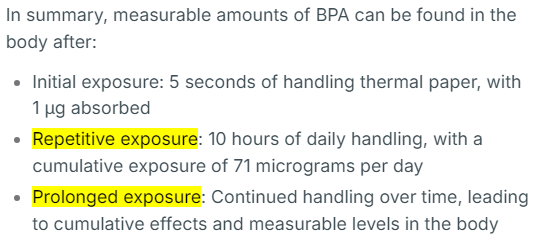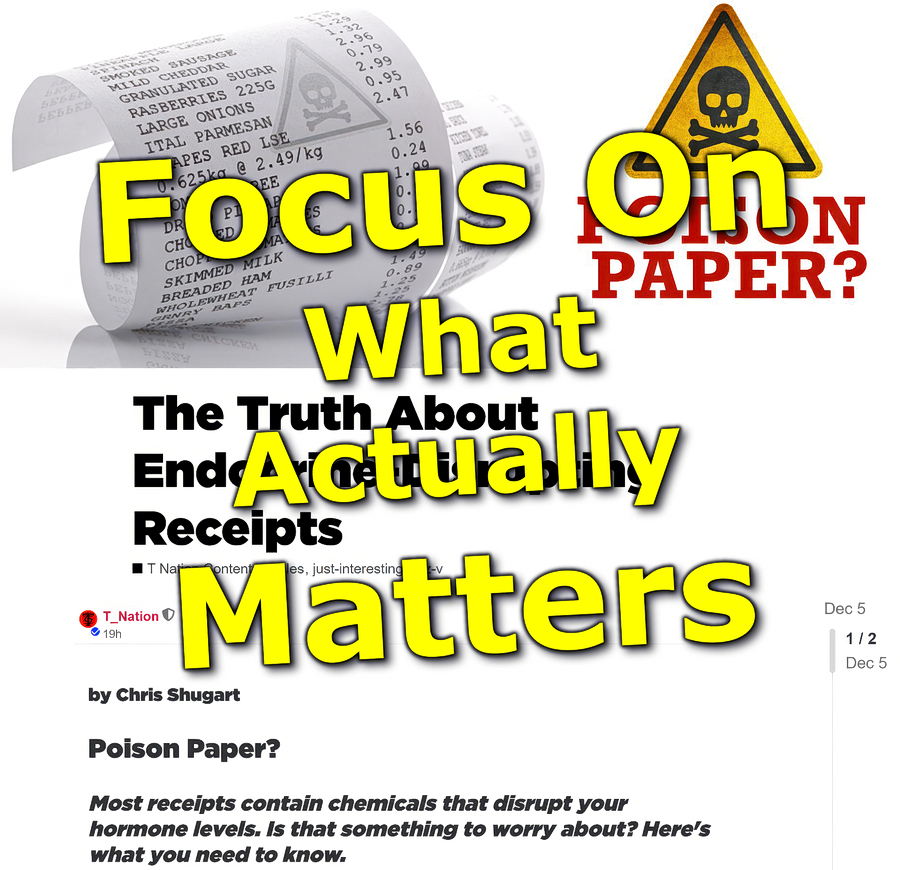Today we return to T-Nation and their COO Chris Shugart as he tackles the silly issue of touching BPA-drenched receipts. I’ve had a good laugh about this one for years, as with most ‘can’t see the forest because of the trees’ fallacies of overemphasizing the minutiae while neglecting the big picture. So, let’s see if he got this one right and what more there is to add.
“Along with paper, receipts are made from chemicals, including a synthetic chemical called BPA (Bisphenol A) or its cousin, Bisphenol S (BPS). For thermal receipts and tickets, BPA is used in the heat-sensitive coating. These coatings allow the paper to react to heat for printing without using ink.
But BPA is a known endocrine disruptor: it interferes with your hormonal system by mimicking the structure and function of estrogen, potentially affecting biological processes even at low exposure levels.
When you handle thermal paper receipts, BPA is absorbed through the skin. Repeated exposure could result in these chemicals accumulating in your body.”
Key-word being “repeated exposure,” as in touching and holding these papers now and then all through the day, or playing with it in your hand during one of your breaks at work. I’m pretty sure most people won’t do that, not even those working in a manufacturing facility of said paper.
Now, there was actually one study I came across that mentioned that handling receipts for an average of 11.5 minutes during the course of a day can lead to significant BPA absorption. I highly doubt you do that if you actually accept a receipt at a store or are working with any kind of thermal paper. Most people would just put it in their pocket or throw it away, as in touching it for only a few seconds.


Also, as with all toxic substances that can be absorbed through the skin, it’s also a matter of surface area of skin contact. The more skin surface area in contact with the thermal paper, the higher the potential for BPA absorption. Holding receipts with more than three fingertips or allowing the paper to touch the palm of the hand can increase BPA absorption.
But again, the largest factor is time of exposure, as in several minutes. And of course, repeated exposure. Touching a receipt once or twice a week, even if for a minute, is not much. But doing it every day could cause accumulation to occur, which could spell real trouble.
“What happens then? Metabolic disorders, cardiovascular issues, infertility, and even some types of cancer. The biggest immediate worry, though, is BPA’s ability to lower testosterone by impairing the Leydig cells, reducing the activity of key enzymes involved in testosterone synthesis, interfering with the HPG axis, and maybe even fudging with gene expression, potentially causing long-term T suppression.”
Yeah, while thermal paper contains up to 250-1,000 times more BPA than packaged processed food, especially canned food and drinks, the absorption through the skin is very limited compared to ingesting something. The skin is a natural barrier, while your digestive system is wide open for any kind of toxin, pollutant, heavy metal or other harmful foreign compound. Same is true for your lungs and anything you inhale, such as dust contaminated with BPA and other pollutants.
And yes, BPA mimics estrogen and can bind to estrogen receptors, altering hormone function leading to reproductive issues (infertility, PCOS, early puberty,) neurobehavioral problems (anxiety, depression,) and metabolic disorders (especially in someone consuming the wrong kind of foods, as in plant-based and processed foods.)
BPA can also damage the thyroid, the liver, the cardiovascular system, and the Leydig cells.
Oh, Calm Down! Receipts Are the Least of Your Worries!
“Is this concern legit or have we fallen prey to the engagement farming tactics of fitness influencers? Well, I’ll let you decide, but here’s the case against receipt-fear:
The actual absorption rate of BPA and BPS is very low. Your skin is a natural barrier. The chemicals probably can’t penetrate deeply enough to enter the bloodstream in meaningful amounts.
Moreover, short contact times with receipts make prolonged absorption unlikely. Now, things like lotions, sweat, or hand sanitizers can increase skin permeability, potentially leading to higher absorption, but you’d have to cover your sticky body with receipts and sit there for hours.”
This might be the first time you actually got something almost completely right, Shugart. Congratulations are in order.
While a bit exaggerated, simply touching receipts or thermal paper for 5 or 10 seconds will not do anything to your health. As mentioned earlier, one study saw an increase in BPA in people handling thermal paper, as in receipts, for more than 11.5 minutes during the course of a day — with real high toxic levels after 10 hours!
Also, it should be noted that a study found that using retarded hand sanitizers increased transfer of BPA to the skin by factors of 22-200 times. That is not surprising as any kind of alcohol or antimicrobial substance destroys parts of the protective layer of the skin, as in natural oils, sweat and bacteria.

“BPA can be nasty stuff, but most studies focus on exposure through ingestion rather than dermal contact: worry about eating it, not touching it. The only people who may need to worry are cashiers who handle receipts all day, and they can wear gloves.”
Yes, most cashiers wear gloves nowadays, especially after the fake and staged coronavirus psy-op played on the world stage for the extremely dumbed-down and gullible slaves. While wearing gloves in general is very bad for bacteria diversity and thus your health, it can be protective and a good idea if handling toxic stuff, such as thermal paper or other chemically contaminated items.
The Practical Middle Ground
“I’ll continue to worry more about eating than touching. The amount of BPA and other chemicals in receipts pales compared to other sources. So, that means avoiding plastic cooking utensils, looking for PBA-free canned goods (manufacturers are moving away from BPA-lined cans already), not drinking from heated plastic containers, and not licking the dashboard of a new car.”
Yeah, licking chemically laden stuff is generally a bad idea. Save that tongue-action for your significant other.
As for the points, I do agree. Worrying about irrelevant details like these will stress and harm your body way more than anything you might come in contact with. Well, except for speeding trucks with newly licked dashboards. Don’t make contact with those, or any speeding object for that matter. It would probably be way worse than holding that receipt.
Joking aside, touching something with BPA once in a while won’t hurt you. Focus on the bigger picture instead.
“I’ll quickly do a “two-finger receipt grab” from a self-checkout and drop it in a bag. Or I’ll ask the cashier to place it in the bag. Maybe I’ll sign up for e-receipts when offered. I’ll do this because I don’t like certain words the research uses when referring to endocrine disruptors – words like “minimal effect “and “probably safe.” Minimal? Probably?”
It’s kind of funny Chris, that you mention this about research and studies when you blindly follow them whenever it suits your agenda, as in promoting extremely toxic and useless supplements.
Anyhow, do not fret the silly receipts. Focus on your diet and your lifestyle. If you still consume anything plant-based or processed, that will do a million times more damage than touching a receipt, even playing with it for a few minutes.
One Problem: Endocrine Disruptors Are Everywhere
“BPA is just one chemical in a single category (bisphenols) of endocrine disruptors. There are more:
- Phthalates found in air fresheners, fragrances, lotions, and shampoos.
- Parabens in cosmetics, personal care products, and foods.
- PFAS found in nonstick pans.
- Pesticides, heavy metals, industrial pollution, plastic pipes, and more.
I would say you’d have to live in a giant plastic bubble to avoid all these endocrine disruptors, but giant plastic bubbles are probably full of them.”
Yes, indeed. That’s why my coaching guides and programs have had several pages dedicated to this subject since around 2009. All you can do is limit your immediate exposure to them in your home and the surroundings you spend a lot of time in, as in making sure all products you use and come in contact with are as natural as possible.
However, the most important factor is of course your diet, making sure that you follow our natural human animal-based diet, ensuring that you get all essential nutrients so your body can detoxify and heal from any exposure you might come in contact with.
After this, Chris Shugart tries to sell you on the extremely toxic and deadly ‘resveratrol’ supplement. Do not be a gullible idiot and think that anything that is highly toxic can be beneficial. Anything from the plant kingdom is chemically incompatible with human physiology and thus inherently toxic and damaging. Believing that any such toxic substance can help in any way is idiotic, it’s an oxymoron.

To summarize, make sure your diet is in order, preferably fully carnivore, and then read up on toxins in your environment and do your best to limit your exposure to them. Some exposure is no concern if you’re healthy and follow our natural diet, as you can detoxify. So, again, stop overemphasizing the minutiae and look at the big picture, the things that really matter.

If you need help with any kind of health problems or transitioning from your current way of eating to our natural species-appropriate, species-specific way of eating, I’m available for both coaching and consultation.
Coaching and Consultation
And if you found the article and my insights helpful and enjoy my daily free information, please consider donating to help pay the webhosting bills and keep the site running. And if you’re interested in discussing and sharing information with likeminded people, consider joining our uncensored community at Ungovernable.se. Thank you!

